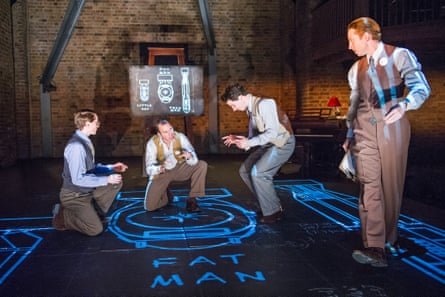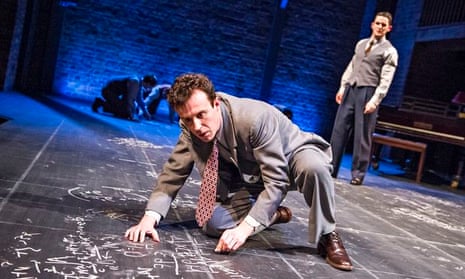“Oppenheimer’s stature is not in question, but do we have a playwright big enough to depict him?” That was the question posed by critic Eric Bentley in 1969. The answer has been found in the shape of Tom Morton-Smith, a 34-year-old dramatist with a handful of fringe credits, who has come up with this massively impressive three-hour play for the RSC: one that shows the father of the atomic bomb and leader of America’s Manhattan project to be a genuinely tragic hero.
Oppenheimer’s tragedy, in Morton-Smith’s version, takes many forms. The most obvious is that this visionary scientist, who led the team that created the bombs released on Hiroshima and Nagasaki, had to live with the moral consequences of his discoveries: “I feel,” he says, “like I’ve dropped a loaded gun in a playground.”
But Oppenheimer is also tragic in that his espousal of communism in the 1930s forces him, once he is employed by the US military, to either abandon or, in the case of the academic Haakon Chevalier, betray his former colleagues. And, in terms of his own nature, Oppenheimer is a man in whom professional pride is accompanied by “a core of cold iron”.
What is striking, however, is the panoramic sweep of a play that explores big issues through character and action. Starting in 1934, Morton-Smith alternates scenes showing the anti-fascist fervour of the American left with others exploring theoretical physics. One of the play’s signal virtues is its ability to convey the intoxicating excitement of the initial experiments at Berkeley: the chain reaction that follows when a neutron splits an atom is explained with a clarity that even a lay audience can understand. But Morton-Smith never loses sight of Oppenheimer’s mix of missionary zeal and personal detachment: he swaps lovers as casually as if changing suits and, when recruited by the military to work on the Manhattan project at Los Alamos, sheds his communist past like a snake sloughing its skin.

Morton-Smith neither eulogises nor condemns Oppenheimer: he simply shows him as a flawed human being aware that he has the scientific capacity “to murder every last soul on the planet”. I also can’t imagine him being better played than by John Heffernan, whom the role elevates to star-status. This is no portrayal of the scientist as crazed genius. Instead Heffernan, with his hooded, Mitchumesque eyes and wary gaze, shows us a man who always seems isolated in a crowd. Heffernan also captures perfectly Oppenheimer’s mix of social unease and professional ego, not least in his angry confrontations with Edward Teller, obsessed with pursuing the possibilities of a hydrogen bomb. It’s a performance that brings out the complexity of a man, forever haunted by the destructive power of his achievement.
Angus Jackson’s production catches the propulsive excitement of a play that takes us from a Berkeley campus to a Pacific airbase and Robert Innes Hopkins’s design, with the aid of overhead girders, even brings on stage the bomb – the so-called Fat Man – about to be dropped on Nagasaki. And, in a large cast, there are outstanding performances from Jamie Wilkes as Oppenheimer’s most loyal subordinate, Catherine Steadman as his flaky lover, Ben Allen as the arrogant Teller and William Gaminara as the poker-backed General Groves. The result is the most fascinating play about the moral issues surrounding nuclear physics since Michael Frayn’s Copenhagen.

Comments (…)
Sign in or create your Guardian account to join the discussion